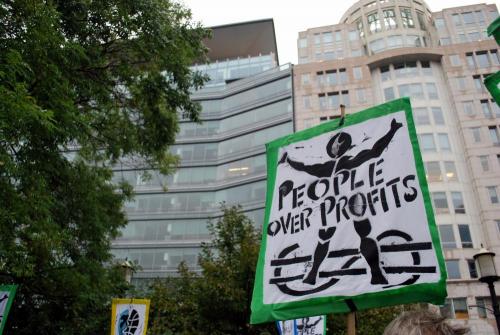
https://corporateaccountability.org/media/press-release-hijack-of-human-...
Geneva, Switzerland – Advocates have called it the “treaty of treaties” for holding transnational corporations (TNCs) accountable for their many public health, environmental, and human rights harms. Its adoption could profoundly influence the course of other treaties that are being negotiated this month. This may explain why business interests—and governments acting at their behest—attempted to scuttle nearly 10 years of work on the Legally Binding Instrument on Transnational Corporations and Human Rights (TNC treaty).
After substantive talks on treaty scope and its program of work early in the week, the treaty chair proposed going back to the drawing board (go to minute 43) as meetings concluded. The proposal effectively could have dismantled the current treaty body and formed a new one. The proposal was met with widespread condemnation from civil society (go to minute 46) and many Global South governments.
“This is a treaty from its inception that was intended to address the glaring deficits in international law to hold the largest, most powerful, transnational corporations accountable for their flagrant, far-reaching, and devastating human rights violations. To dilute that intent is to compromise the very heart of the treaty,” said Joseph Purugganan of Focus on the Global South.
Wesam Ahmad, from the Al-Haq Center for Applied International Law emphasized that countries need look no further than the genocide in Gaza for urgency in advancing the current treaty. “It must not be lost on the initial champions of this treaty process, including many in the African and Latin American group, that the same companies historically involved in the suffering of their people are developing interests today in the natural gas fields of the Mediterranean Sea, while arms manufactures are struggling to meet demand for the conflict.”
“Communities across the world that have been savaged by corporations like Chevron, Shell, and Monsanto/Bayer have come to this treaty process for close to a decade to attain justice and deliver what no existing court could. Scrapping it is not some ‘new day,’ just further delay in honoring universal human rights,” said Pablo Fajardo, of UDAPT.
Civil society and governments alike were further taken aback by the chair’s proposal, especially given the progress the treaty has and continues to inspire by way of new laws being introduced from France, Germany, and the EU to Brazil and Argentina.
From the outset of talks, wide-ranging constituencies pressed for the body to make more rapid progress in finalizing a strong treaty text. U.S. Representative Raul Grijalva implored the Biden Administration to better align its stance on the treaty with that of its domestic agenda on human rights. Members of the Global Interparliamentary Network spoke to the threats TNCs pose to legislative bodies that the treaty could remedy. And representatives from a network of hundreds of civil society organizations rallied outside the Palais des Nations.
But as in prior years, those whose violations the nascent treaty is intended to address, mounted their own offensive. Absent safeguards against industry interference in the talks, entities representing some of the worst human rights violators, like the International Chamber of Commerce and U.S. Council for International Business, directly addressed delegates. Each argued the need for violators’ interests to have a seat at the table.
“Corporate interference in this process is one of the main obstacles to securing a strong treaty. The consistent interference of corporate front groups in this process is part of an attempt to normalize corporate capture in policymaking – from our capitals at home to the halls of the United Nations,” said Erika Mendes from Ja! And Friends of the Earth Mozambique.
Advocates point to precedents within the U.N. System such as the global tobacco treaty’s safeguards against industry interference as guidestars for the TNC treaty. Civil society is also advancing an Accountability Framework within the United Nations Framework Convention on Climate Change that is breaking new ground and could be instructive as well. Upcoming pandemic and plastics treaty talks are also reckoning with corporate cooptation and capture in parallel.
“Each of the global treaties being negotiated this month is or needs to be advancing legal liability for transnational corporations’ harms. The TNC treaty could help engender sweeping progress on this and related fronts for each. But it can do no such thing if it is cast aside,” said Shayda Naficy, a spokesperson for Corporate Accountability.









